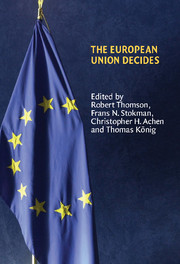Book contents
- Frontmatter
- Contents
- List of figures
- List of tables
- Notes on contributors
- Preface
- 1 Explaining legislative decision-making in the European Union
- 2 Research design: measuring actors' positions, saliences and capabilities
- 3 Testing procedural models of EU legislative decision-making
- 4 Institutional realism and bargaining models
- 5 Compromise, exchange and challenge in the European Union
- 6 Nash versus Schelling? The importance of constraints in legislative bargaining
- 7 A cooperative approach to decision-making in the European Union
- 8 A procedural exchange model of EU legislative politics
- 9 Beyond informal compromise: testing conditional formal procedures of EU decision-making
- 10 Evaluating political decision-making models
- 11 Evidence with insight: what models contribute to EU research
- Appendix I Selection of Commission proposals
- Appendix II Comparison of expert judgements with each other and with information from Council documentation
- References
- Index
- Title in this series
Appendix I - Selection of Commission proposals
Published online by Cambridge University Press: 22 September 2009
- Frontmatter
- Contents
- List of figures
- List of tables
- Notes on contributors
- Preface
- 1 Explaining legislative decision-making in the European Union
- 2 Research design: measuring actors' positions, saliences and capabilities
- 3 Testing procedural models of EU legislative decision-making
- 4 Institutional realism and bargaining models
- 5 Compromise, exchange and challenge in the European Union
- 6 Nash versus Schelling? The importance of constraints in legislative bargaining
- 7 A cooperative approach to decision-making in the European Union
- 8 A procedural exchange model of EU legislative politics
- 9 Beyond informal compromise: testing conditional formal procedures of EU decision-making
- 10 Evaluating political decision-making models
- 11 Evidence with insight: what models contribute to EU research
- Appendix I Selection of Commission proposals
- Appendix II Comparison of expert judgements with each other and with information from Council documentation
- References
- Index
- Title in this series
Summary
Chapter 2 describes the criteria used to select the Commission proposals included in our study. They had to be subject to either the co-decision or consultation procedures, be pending in the years 1999 and/or 2000, and be to some extent controversial.
With regard to 14 of the 26 co-decision proposals, a change to the legislative procedure nevertheless did occur. The significance of this change is open to debate. Proposals subject to the co-decision procedure were included in the selection, even if they had been introduced as co-decision proposals before the Amsterdam Treaty came into effect, and were decided upon afterwards. Such proposals underwent a procedural change, since the co-decision procedure was amended by the Amsterdam Treaty. In particular, the previous (Maastricht) version of the co-decision procedure allowed the Council to reaffirm its common position in the face of protracted disagreement between the Council and the European Parliament (EP). The proposal was then adopted in accordance with the Council's common position unless an absolute majority of all Members of European Parliament (MEPs) voted to reject it. The Treaty of Amsterdam removed what some have interpreted as the Council's ability to make a ‘take it or leave it’ offer to the EP. In the new version of the co-decision procedure, the Council and the EP have to reach an agreement if the legislation is to pass.
- Type
- Chapter
- Information
- The European Union Decides , pp. 317 - 328Publisher: Cambridge University PressPrint publication year: 2006



